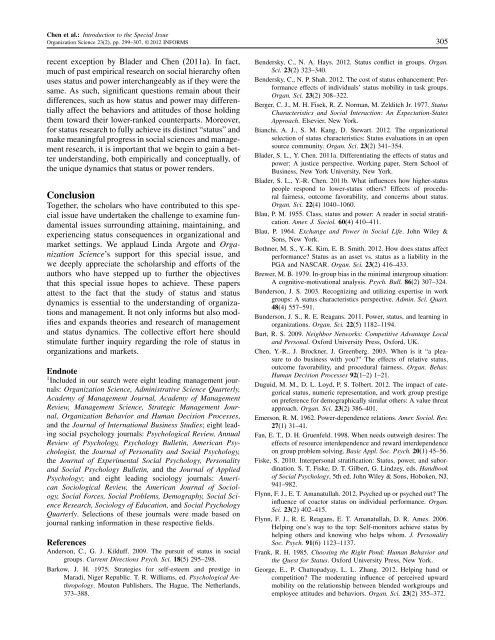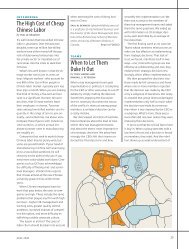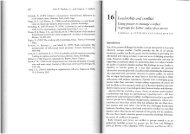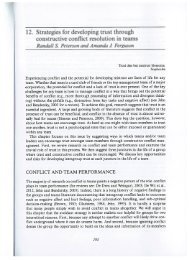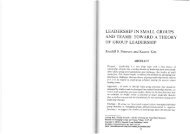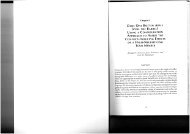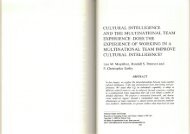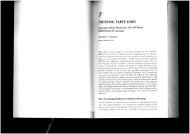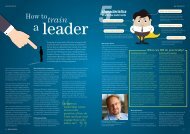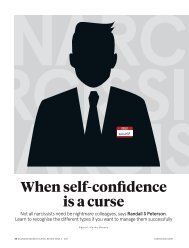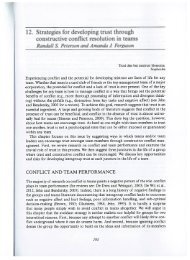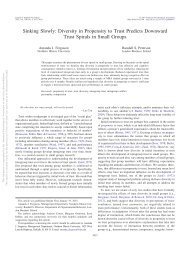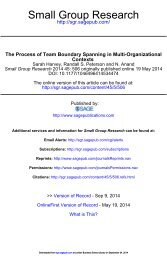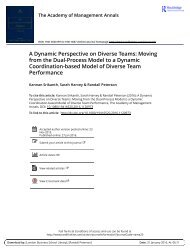Introduction to the Special Issue: Bringing Status to the Table—Attaining, Maintaining, and Experiencing Status in Organizations and Markets
Create successful ePaper yourself
Turn your PDF publications into a flip-book with our unique Google optimized e-Paper software.
Chen et al.: <strong>Introduction</strong> <strong>to</strong> <strong>the</strong> <strong>Special</strong> <strong>Issue</strong><br />
Organization Science 23(2), pp. 299–307, © 2012 INFORMS 305<br />
recent exception by Blader <strong>and</strong> Chen (2011a). In fact,<br />
much of past empirical research on social hierarchy often<br />
uses status <strong>and</strong> power <strong>in</strong>terchangeably as if <strong>the</strong>y were <strong>the</strong><br />
same. As such, significant questions rema<strong>in</strong> about <strong>the</strong>ir<br />
differences, such as how status <strong>and</strong> power may differentially<br />
affect <strong>the</strong> behaviors <strong>and</strong> attitudes of those hold<strong>in</strong>g<br />
<strong>the</strong>m <strong>to</strong>ward <strong>the</strong>ir lower-ranked counterparts. Moreover,<br />
for status research <strong>to</strong> fully achieve its dist<strong>in</strong>ct “status” <strong>and</strong><br />
make mean<strong>in</strong>gful progress <strong>in</strong> social sciences <strong>and</strong> management<br />
research, it is important that we beg<strong>in</strong> <strong>to</strong> ga<strong>in</strong> a better<br />
underst<strong>and</strong><strong>in</strong>g, both empirically <strong>and</strong> conceptually, of<br />
<strong>the</strong> unique dynamics that status or power renders.<br />
Conclusion<br />
Toge<strong>the</strong>r, <strong>the</strong> scholars who have contributed <strong>to</strong> this special<br />
issue have undertaken <strong>the</strong> challenge <strong>to</strong> exam<strong>in</strong>e fundamental<br />
issues surround<strong>in</strong>g atta<strong>in</strong><strong>in</strong>g, ma<strong>in</strong>ta<strong>in</strong><strong>in</strong>g, <strong>and</strong><br />
experienc<strong>in</strong>g status consequences <strong>in</strong> organizational <strong>and</strong><br />
market sett<strong>in</strong>gs. We applaud L<strong>in</strong>da Argote <strong>and</strong> Organization<br />
Science’s support for this special issue, <strong>and</strong><br />
we deeply appreciate <strong>the</strong> scholarship <strong>and</strong> efforts of <strong>the</strong><br />
authors who have stepped up <strong>to</strong> fur<strong>the</strong>r <strong>the</strong> objectives<br />
that this special issue hopes <strong>to</strong> achieve. These papers<br />
attest <strong>to</strong> <strong>the</strong> fact that <strong>the</strong> study of status <strong>and</strong> status<br />
dynamics is essential <strong>to</strong> <strong>the</strong> underst<strong>and</strong><strong>in</strong>g of organizations<br />
<strong>and</strong> management. It not only <strong>in</strong>forms but also modifies<br />
<strong>and</strong> exp<strong>and</strong>s <strong>the</strong>ories <strong>and</strong> research of management<br />
<strong>and</strong> status dynamics. The collective effort here should<br />
stimulate fur<strong>the</strong>r <strong>in</strong>quiry regard<strong>in</strong>g <strong>the</strong> role of status <strong>in</strong><br />
organizations <strong>and</strong> markets.<br />
Endnote<br />
1 Included <strong>in</strong> our search were eight lead<strong>in</strong>g management journals:<br />
Organization Science, Adm<strong>in</strong>istrative Science Quarterly,<br />
Academy of Management Journal, Academy of Management<br />
Review, Management Science, Strategic Management Journal,<br />
Organization Behavior <strong>and</strong> Human Decision Processes,<br />
<strong>and</strong> <strong>the</strong> Journal of International Bus<strong>in</strong>ess Studies; eight lead<strong>in</strong>g<br />
social psychology journals: Psychological Review, Annual<br />
Review of Psychology, Psychology Bullet<strong>in</strong>, American Psychologist,<br />
<strong>the</strong> Journal of Personality <strong>and</strong> Social Psychology,<br />
<strong>the</strong> Journal of Experimental Social Psychology, Personality<br />
<strong>and</strong> Social Psychology Bullet<strong>in</strong>, <strong>and</strong> <strong>the</strong> Journal of Applied<br />
Psychology; <strong>and</strong> eight lead<strong>in</strong>g sociology journals: American<br />
Sociological Review, <strong>the</strong> American Journal of Sociology,<br />
Social Forces, Social Problems, Demography, Social Science<br />
Research, Sociology of Education, <strong>and</strong> Social Psychology<br />
Quarterly. Selections of <strong>the</strong>se journals were made based on<br />
journal rank<strong>in</strong>g <strong>in</strong>formation <strong>in</strong> <strong>the</strong>se respective fields.<br />
References<br />
Anderson, C., G. J. Kilduff. 2009. The pursuit of status <strong>in</strong> social<br />
groups. Current Directions Psych. Sci. 18(5) 295–298.<br />
Barkow, J. H. 1975. Strategies for self-esteem <strong>and</strong> prestige <strong>in</strong><br />
Maradi, Niger Republic. T. R. Williams, ed. Psychological Anthropology.<br />
Mou<strong>to</strong>n Publishers, The Hague, The Ne<strong>the</strong>rl<strong>and</strong>s,<br />
373–388.<br />
Bendersky, C., N. A. Hays. 2012. <strong>Status</strong> conflict <strong>in</strong> groups. Organ.<br />
Sci. 23(2) 323–340.<br />
Bendersky, C., N. P. Shah. 2012. The cost of status enhancement: Performance<br />
effects of <strong>in</strong>dividuals’ status mobility <strong>in</strong> task groups.<br />
Organ. Sci. 23(2) 308–322.<br />
Berger, C. J., M. H. Fisek, R. Z. Norman, M. Zelditch Jr. 1977. <strong>Status</strong><br />
Characteristics <strong>and</strong> Social Interaction: An Expectation-States<br />
Approach. Elsevier, New York.<br />
Bianchi, A. J., S. M. Kang, D. Stewart. 2012. The organizational<br />
selection of status characteristics: <strong>Status</strong> evaluations <strong>in</strong> an open<br />
source community. Organ. Sci. 23(2) 341–354.<br />
Blader, S. L., Y. Chen. 2011a. Differentiat<strong>in</strong>g <strong>the</strong> effects of status <strong>and</strong><br />
power: A justice perspective. Work<strong>in</strong>g paper, Stern School of<br />
Bus<strong>in</strong>ess, New York University, New York.<br />
Blader, S. L., Y.-R. Chen. 2011b. What <strong>in</strong>fluences how higher-status<br />
people respond <strong>to</strong> lower-status o<strong>the</strong>rs? Effects of procedural<br />
fairness, outcome favorability, <strong>and</strong> concerns about status.<br />
Organ. Sci. 22(4) 1040–1060.<br />
Blau, P. M. 1955. Class, status <strong>and</strong> power: A reader <strong>in</strong> social stratification.<br />
Amer. J. Sociol. 60(4) 410–411.<br />
Blau, P. 1964. Exchange <strong>and</strong> Power <strong>in</strong> Social Life. John Wiley &<br />
Sons, New York.<br />
Bothner, M. S., Y.-K. Kim, E. B. Smith. 2012. How does status affect<br />
performance? <strong>Status</strong> as an asset vs. status as a liability <strong>in</strong> <strong>the</strong><br />
PGA <strong>and</strong> NASCAR. Organ. Sci. 23(2) 416–433.<br />
Brewer, M. B. 1979. In-group bias <strong>in</strong> <strong>the</strong> m<strong>in</strong>imal <strong>in</strong>tergroup situation:<br />
A cognitive-motivational analysis. Psych. Bull. 86(2) 307–324.<br />
Bunderson, J. S. 2003. Recogniz<strong>in</strong>g <strong>and</strong> utiliz<strong>in</strong>g expertise <strong>in</strong> work<br />
groups: A status characteristics perspective. Adm<strong>in</strong>. Sci. Quart.<br />
48(4) 557–591.<br />
Bunderson, J. S., R. E. Reagans. 2011. Power, status, <strong>and</strong> learn<strong>in</strong>g <strong>in</strong><br />
organizations. Organ. Sci. 22(5) 1182–1194.<br />
Burt, R. S. 2009. Neighbor Networks: Competitive Advantage Local<br />
<strong>and</strong> Personal. Oxford University Press, Oxford, UK.<br />
Chen, Y.-R., J. Brockner, J. Greenberg. 2003. When is it “a pleasure<br />
<strong>to</strong> do bus<strong>in</strong>ess with you?” The effects of relative status,<br />
outcome favorability, <strong>and</strong> procedural fairness. Organ. Behav.<br />
Human Decision Processes 92(1–2) 1–21.<br />
Duguid, M. M., D. L. Loyd, P. S. Tolbert. 2012. The impact of categorical<br />
status, numeric representation, <strong>and</strong> work group prestige<br />
on preference for demographically similar o<strong>the</strong>rs: A value threat<br />
approach. Organ. Sci. 23(2) 386–401.<br />
Emerson, R. M. 1962. Power-dependence relations. Amer. Sociol. Rev.<br />
27(1) 31–41.<br />
Fan, E. T., D. H. Gruenfeld. 1998. When needs outweigh desires: The<br />
effects of resource <strong>in</strong>terdependence <strong>and</strong> reward <strong>in</strong>terdependence<br />
on group problem solv<strong>in</strong>g. Basic Appl. Soc. Psych. 20(1) 45–56.<br />
Fiske, S. 2010. Interpersonal stratification: <strong>Status</strong>, power, <strong>and</strong> subord<strong>in</strong>ation.<br />
S. T. Fiske, D. T. Gilbert, G. L<strong>in</strong>dzey, eds. H<strong>and</strong>book<br />
of Social Psychology, 5th ed. John Wiley & Sons, Hoboken, NJ,<br />
941–982.<br />
Flynn, F. J., E. T. Amanatullah. 2012. Psyched up or psyched out? The<br />
<strong>in</strong>fluence of coac<strong>to</strong>r status on <strong>in</strong>dividual performance. Organ.<br />
Sci. 23(2) 402–415.<br />
Flynn, F. J., R. E. Reagans, E. T. Amanatullah, D. R. Ames. 2006.<br />
Help<strong>in</strong>g one’s way <strong>to</strong> <strong>the</strong> <strong>to</strong>p: Self-moni<strong>to</strong>rs achieve status by<br />
help<strong>in</strong>g o<strong>the</strong>rs <strong>and</strong> know<strong>in</strong>g who helps whom. J. Personality<br />
Soc. Psych. 91(6) 1123–1137.<br />
Frank, R. H. 1985. Choos<strong>in</strong>g <strong>the</strong> Right Pond: Human Behavior <strong>and</strong><br />
<strong>the</strong> Quest for <strong>Status</strong>. Oxford University Press, New York.<br />
George, E., P. Chat<strong>to</strong>padyay, L. L. Zhang. 2012. Help<strong>in</strong>g h<strong>and</strong> or<br />
competition? The moderat<strong>in</strong>g <strong>in</strong>fluence of perceived upward<br />
mobility on <strong>the</strong> relationship between blended workgroups <strong>and</strong><br />
employee attitudes <strong>and</strong> behaviors. Organ. Sci. 23(2) 355–372.


